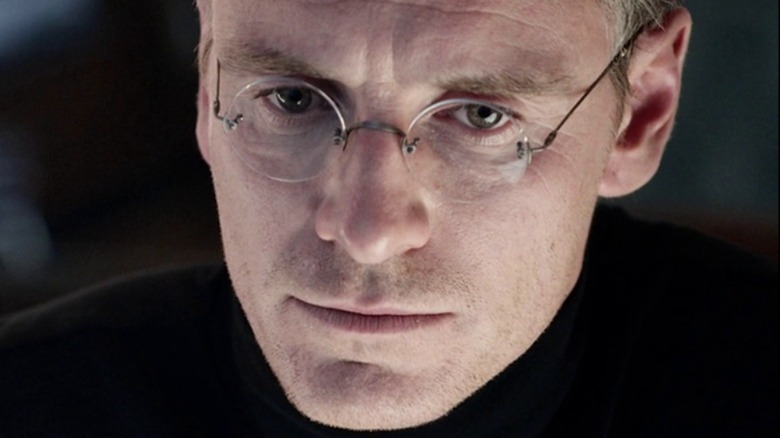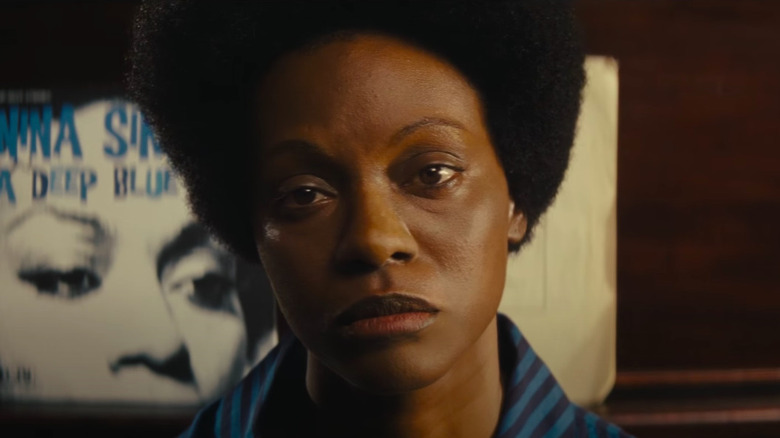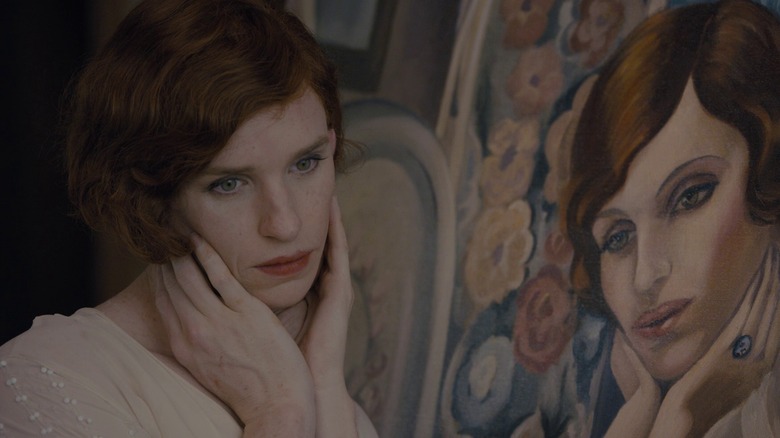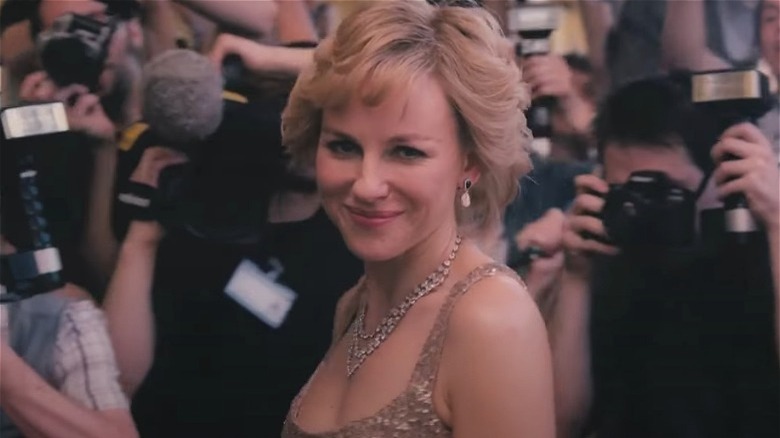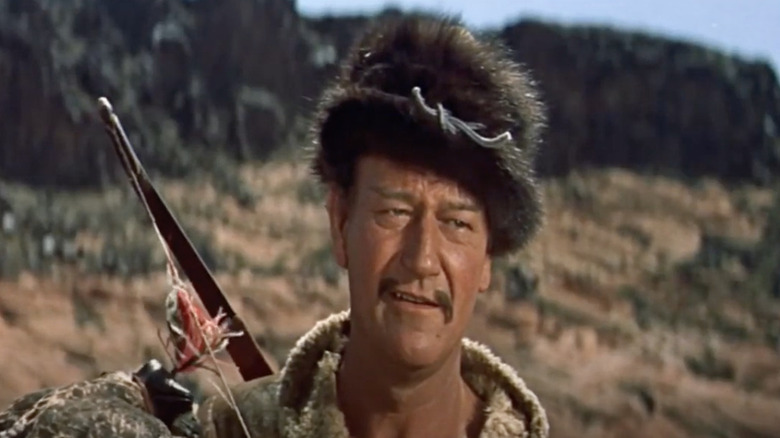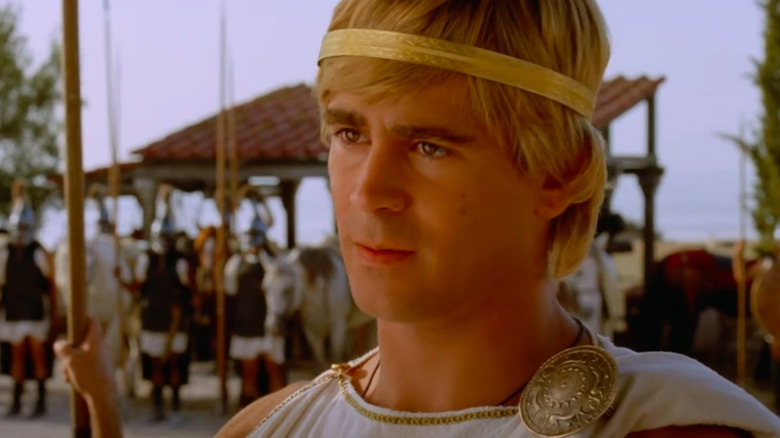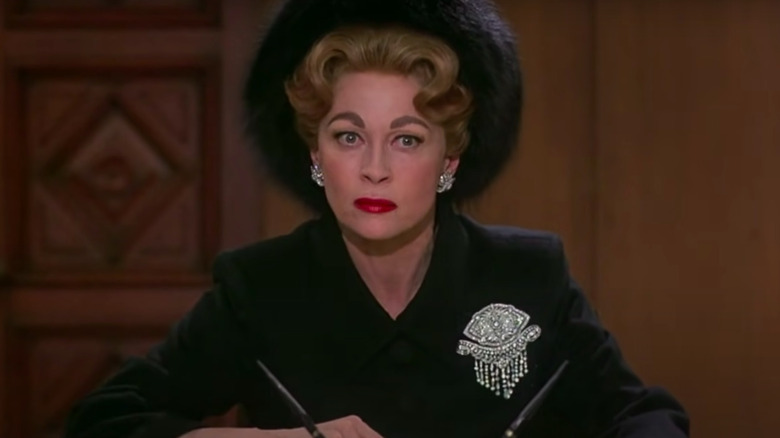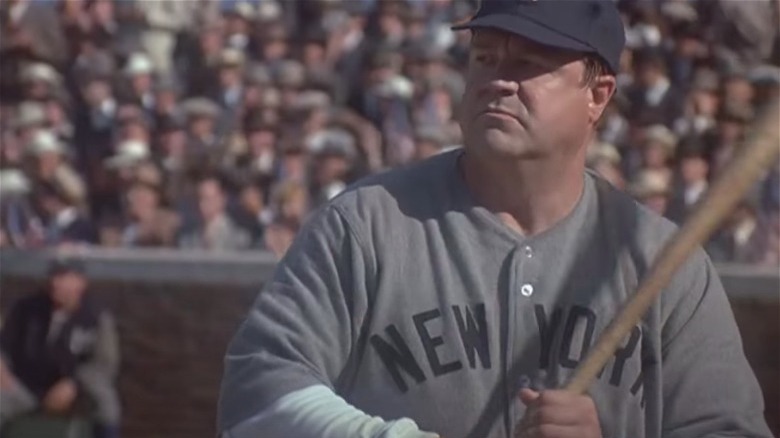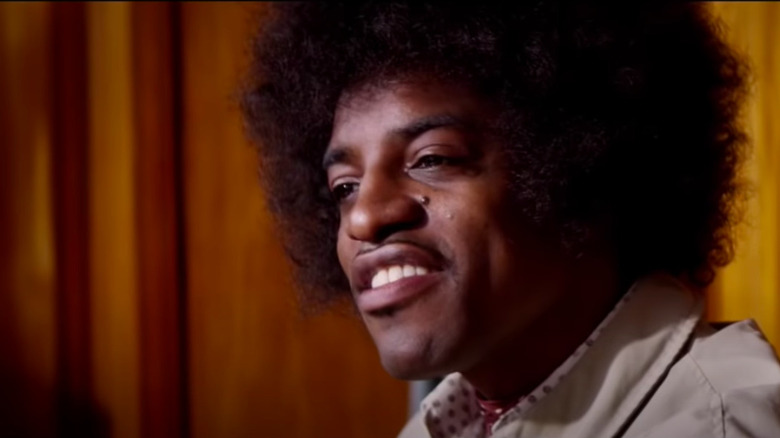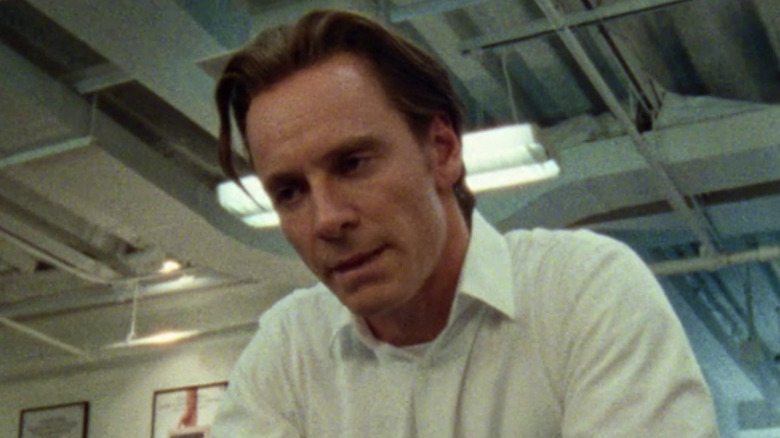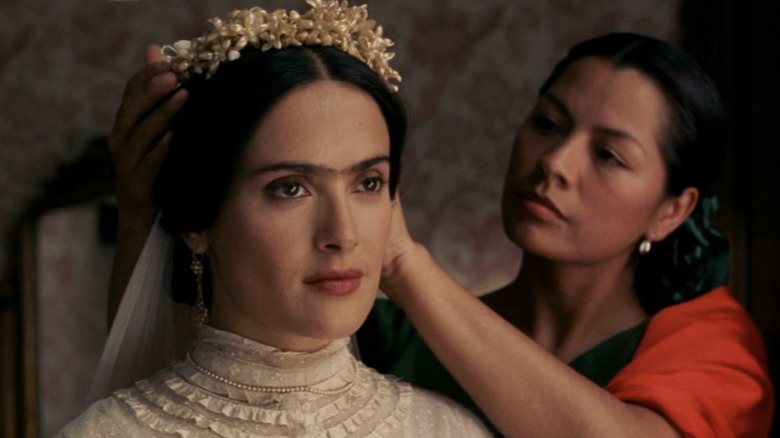Biopics The Actors Regret Filming
As aspiring actors clamber their way to the top of the A-list, they're bound to star in some duds. Some have taken embarrassing early roles they'd probably rather forget, such as Tom Hanks' debut in the 1980 low-budget slasher "He Knows You're Alone." Meanwhile, other actors have had regrets over the roles that made them famous, like Robert Pattinson's open disdain for "Twilight" — the franchise that turned him into a teen heartthrob.
After they become big enough box office draws, sometimes actors will get offered roles in biopics. As No Film School notes, that can often lead to an Oscar nomination since the Academy seems to love a biopic. Unfortunately, not all biographical movies end up being successful. Some, in fact, end up irritating the actual subject of the movie either due to the storytelling or the actor's skills.
Of course, not getting the seal of approval from the real-life counterpart of the characters they're embodying on-screen can certainly hurt a star's ego and lead to the audience's ridicule, which can sour the whole experience for an actor. For other actors, the demanding nature of a role and getting into their subject's head can also lead to some real-life consequences. Whatever the case, these stars have regrets about the biopics they've starred in.
Zoe Saldana as Nina Simone
From the get-go, the 2016 biopic on the "High Priestess of Soul" Nina Simone — aptly titled "Nina" — was met with controversy. In an interview with Ebony, the legendary crooner's daughter, Lisa, bemoaned the casting of Zoe Saldana, an actress of Dominican and Puerto Rican descent. While she noted she was a fan of Saldana, she had other picks to play her African-American mother, such as Viola Davis or Kimberly Elise. "Both of the actresses that I've mentioned are women of color, are women with beautiful, luscious lips and wide noses, and who know their craft," she explained.
Per Jezebel, Saldana — a light-skinned Black woman — wore a wig, prosthetic nose, and brown makeup to look more like the dark-skinned singer, which, as the outlet explains, can be considered blackface. Despite the controversy, Saldana powered through, even taking to Twitter to share a motivational quote by Simone — which was immediately shut down by the singer's estate. Critics absolutely panned "Nina" (it holds an atrocious near-0% rating on Rotten Tomatoes), leading Saldana to issue an apology.
In an Instagram Live chat with BESE, the star declared (around the 41-minute mark), "I should have never played Nina ... I should've tried everything in my power to cast a Black woman to play an exceptionally perfect Black woman." Surprisingly, Simone's daughter came to Saldana's defense after the movie's release, poignantly telling Time, "It's unfortunate that Zoe Saldana is being attacked so viciously when she is someone who is part of a larger picture ... she's being attacked when she's not responsible for any of the writing or the lies."
Eddie Redmayne as Lili Elbe
Eddie Redmayne is no stranger to a good biopic. He famously won both an Oscar and a Golden Globe for his turn as Stephen Hawking in 2014's "The Theory of Everything," and appeared in 2011's "My Week with Marilyn" as production assistant-turned-filmmaker Colin Clark. A year after playing Hawking, Redmayne took on the role of Lili Elbe, an artist and one of the first people to undergo gender reassignment surgery, in "The Danish Girl."
While Redmayne received praise for the role (and snagged nominations both at the Academy Awards and Golden Globes), there was also a fair share of criticism, with some critics believing that the role of Elbe should have gone to a trans star. Years after the film's release, Redmayne himself spoke out in a 2021 interview with The Sunday Times, sharing his thoughts on the controversy. "I wouldn't take it on now," the actor reflected, adding, "I made that film with the best intentions, but I think it was a mistake. The bigger discussion about the frustrations around casting is because many people don't have a chair at the table."
Not everyone agreed with Redmayne, however. Often-quarrelsome journalist Piers Morgan tweeted in response to the actor's interview, "What next — only real Mafia mobsters can play Mafia mobsters?" For the most part though, many A-listers agreed with Redmayne's stance, such as trans star Yasmin Finney of "Doctor Who" fame. While applauding Redmayne's performance, Finney also pointed out the problematic reality of placing a cisgendered person in a trans role, as it can validate certain painful misconceptions that people have about trans folks (via The Guardian).
Naomi Watts as Princess Diana
Decades after the death of Diana, Princess of Wales, fans are still mesmerized by her tragic story. Vox explores the continuing appeal of Diana's story, noting how "The Crown" viewers were eagerly awaiting the debut of Diana in Season 4 of the acclaimed Netflix series in 2020. The following year saw the release of "Spencer," Pablo Larraín's biopic starring Kristen Stewart in an Oscar-nominated turn. Numerous stories have been made detailing the icon's life, and as The Telegraph notes, many of the efforts have proved unsuccessful.
Oliver Hirschbiegel made one such attempt with 2013's "Diana," which holds an abysmal single-digit score on Rotten Tomatoes. According to Reader's Digest, when the press announced that British actress Naomi Watts would step into Diana's kitten heels, the response was initially positive, thanks to the accurate wardrobe and makeup. Yet after the flick's release, the absurd script and other issues led to its flop. So, what did Watts have to say? Ahead of the biopic's premiere, the starlet quipped to InStyle UK, "I might go into hiding" (via E! News).
The star did indeed attempt to disappear when the subject around her role came up in subsequent interviews. During a chat with radio presenter Simon Mayo, Watts abruptly left the discussion, after Mayo began asking her about innocuous behind-the-scenes details. Speaking to Harper's Bazaar after "Diana's" release, Watts explained that the film "ended up taking a direction that was not the one I was hoping for," before noting that "If you have to go down with that sinking ship, so be it" (via Vanity Fair).
John Wayne as Genghis Khan
The disaster that was the 1956 adventure flick "The Conqueror" haunted its leading star John Wayne for years after its release. The two-hour epic, which placed Wayne as the Mongol leader Genghis Khan, was an utter critical failure, not to mention problematic, as the American actor was put in yellow-face to look like this Asian historical figure (via The Telegraph).
It wasn't just the harmful portrayal of Khan that resulted in this flop, however. According to The Telegraph, screenwriter Oscar Millard butchered the script to make it grammatically incorrect and instructed Wayne to speak with an Asian accent — which Wayne dropped halfway through the movie, bringing back his signature Western drawl instead. The film was a critical catastrophe. As revealed by film critic Emanuel Levy, Wayne participated in "The Conqueror" as a favor to RKO owner Howard Hughes and was left totally humiliated. According to Emanuel Levy, Wayne once mused that "People would simply not accept me as Genghis Khan. I've been extolled as rough American personality, and they won't take anything else."
Along with Wayne, Hughes was also embarrassed to be associated with the epic. Per The Telegraph, in the final years of his life, Hughes had become a recluse and bought all copies of "The Conqueror" to prevent anyone from seeing the film. He would sit for hours in his bedroom, obsessively watching "The Conqueror" on a projector. In fact, Hughes demanded that his personal projectionist wear a blindfold throughout its runtime to ensure that no eyes but his own saw the doomed picture.
Colin Farrell as Alexander the Great
Colin Farrell had a steady stream of hits in the early 2000s after starring in action-thrillers such as "Minority Report" and "S.W.A.T." Yet his string of success was suddenly tarnished when he took on the titular role of Alexander the Great in Oliver Stone's 2004 biographical epic, "Alexander." Speaking to MovieWeb ahead of the flick's release, Farrell revealed why he accepted the part: "The chance to work with Oliver was the most attractive thing about it," adding that he also fell for what he deemed was a great script. "It was just an amazing, amazing part and amazing character."
Unfortunately, critics didn't share the same thoughts as Farrell. The poor feedback reportedly depressed the actor, to the point where he considered giving up on his career. "It affected me emotionally and psychologically. I was going to walk away from acting," he mused to the Daily Express in 2010. "I couldn't even buy a packet of cigarettes without feeling like I needed to say sorry to the guy behind the counter just in case he happened to see the thing."
Thankfully, this experience may have led to a change in the roles the Irishman was picking. Farrell swapped out blockbusters for indie releases, solidifying his return as a reputable actor in 2008's "In Bruges," followed by more experimental roles in Yorgos Lanthimos' "The Lobster" and "The Killing of a Sacred Deer."
Faye Dunaway as Joan Crawford
Joan Crawford was a legend of the Golden Age of Hollywood. The glamorous beauty had quite a long-lasting career (from 1925 to 1970) and won an Oscar in 1946 for her leading role in the noir drama "Mildred Pierce" (via Biography). Sadly, Crawford was also known for her turbulent personal life, and shortly before she died of a heart attack in 1977, news broke that one of her adoptive daughters, Christina, was writing a tell-all book about growing up with her famous mother (via Vanity Fair).
The biography "Mommie Dearest" was released a year after Joan's death, with her daughter portraying Crawford as an abusive, self-centered mother. The book caused a sensation and in 1981, a film adaptation was released, starring a fellow Hollywood icon: Faye Dunaway. Dunaway, who rose to popularity in the '70s by playing hard-as-nails women like Bonnie in "Bonnie and Clyde" and Evelyn in "Chinatown," was excited at the opportunity to play Crawford. In an interview with People, Dunaway revealed that she hoped the film would offer up a "window into a tortured soul, but it was made into camp."
According to Dunaway, she believes that starring in the camp classic "Mommie Dearest" left the public with a poor impression of her — a hard pill to swallow considering she was already known for her alleged diva antics on set, according to The Guardian. As she mused to People, "I should have known better, but sometimes you're vulnerable and you don't realize what you're getting into. ... You make a decision, and then you have to live with the consequence."
John Goodman as Babe Ruth
John Goodman has had an incredibly long-lasting career in Hollywood. He's proven himself over and over again as an icon of comedy, one who now holds the title as one of only three stars to host "SNL" more than ten times. Considering Goodman has enjoyed a four-decade-long career as an actor and occasionally played against type, are there any roles he regrets taking on? "'The Babe.' That's one I want to do over," he explained to GQ in 2019.
The 1992 flick stars Goodman as George Herman "Babe" Ruth and chronicles the influential baseball player's life, from his humble beginnings to his professional success with the Boston Red Sox and New York Yankees. As Goodman dished, he spent months practicing the sport to nail Ruth's technique, yet because they started shooting the baseball scenes a month after he finished training, the actor realized he had forgotten a lot of what he had learned. "I just love the guy so much ... That's always been a do-over film of mine. I just wish I could have gotten it right. I could have gotten it better," he mused to GQ.
At the time of its release, "The Babe" had mixed reviews. It probably doesn't bother Goodman too much, however, because, as he told Fallon, he avoids reading too many critical reviews on his films.
André 3000 as Jimi Hendrix
André Lauren Benjamin — better known as André 3000 of the hip-hop group Outkast — first started acting in 2005 when he starred in "Be Cool" and "Four Brothers." Perhaps his foray into the world of Tinseltown had to do with the fact that the "Hey Ya!" hitmakers have been on hiatus since 2007. That's why, when director John Ridley approached Benjamin about acting in a Jimi Hendrix biopic, the artist told Billboard he was "happy to have something to dive into."
"I felt this isn't about trying to attract the right actor for the role. This is about trying to attract the right person who embodies a certain spirit," declared Ridley to Rolling Stone ahead of the flick's release in 2014. Yet, Benjamin had his doubts, telling Billboard that he thought he wasn't young enough to portray Hendrix in the early years of his career. This worry manifested into full-on regret when the filming of "Jimi: All Is By My Side" went underway. "I was like, 'Man, why did I take this job? Who plays Hendrix? He's the coolest guy in the world,'" recalled the rapper on the "Late Show with David Letterman" (via Essence).
The movie wasn't a financial hit, although it did get decent reviews from critics. Part of the issue came from the film's inability to use original Hendrix compositions, since the Hendrix estate never supported the production (via The Wall Street Journal). Yet, as Benjamin told Collider, while he doesn't consider himself a true actor after this experience and struggled to capture Hendrix's confidence — particularly in trying to play the guitar with his left hand — he's still willing to take on projects he's invested in.
Michael Fassbender as Steve Jobs
Michael Fassbender has proven himself to be a versatile and acclaimed Hollywood actor. He's showcased his vulnerability as the sex-addicted Brandon Sullivan in "Shame," his singing chops in the musical comedy "Frank," and even shown that he can make a powerful impression with his short cameo in Quentin Tarantino's "Inglourious Basterds." With over 60 acting credits to his name (and counting) Fassbender has enjoyed a steady stream of success, but are there any roles he regrets taking on?
During the TIFF Soirée in 2016, Toronto Film Festival's pre-opening-night fundraising event, Fassbender was asked what the most challenging film he made was. According to Vulture, almost instantly, the actor said, "Steve Jobs," Danny Boyle's 2015 biopic that saw him take on the role of the Apple Inc. founder. Although the film was critically acclaimed (and got Fassbender an Oscar nomination), he bemoaned screenwriter Aaron Sorkin's script. "It was so dense! It was such a mountain, and I'm a slow learner, " Fassbender recalled, adding that when he read it, he thought to himself, "This is not me. This should be somebody else. It's a miscast scenario." The star was so convinced that he was wrong for the role that during rehearsals, he would try and put himself in harm's way just to get out of the project.
Sorkin previously wrote the screenplay for the critically-acclaimed biopic about Facebook founder Mark Zuckerberg's life, "The Social Network." While Zuckerberg famously denounced the flick, Sorkin's interpretation of the events in "Steve Jobs" did win praise from Apple's co-founder Steve Wozniak (via BBC).
Salma Hayek as Frida Kahlo
Salma Hayek's turn as Mexican painter Frida Kahlo in 2002's "Frida" is a testament to her perseverance and love for her craft. In an op-ed for The New York Times, Hayek revealed that the revolutionary artist was a major source of inspiration when it came to pursuing her Hollywood career. "She had the courage to express herself while disregarding skepticism. My greatest ambition was to tell her story," Hayek declared.
Hayek co-produced "Frida," and she took the movie to Miramax, which was then run by disgraced producer Harvey Weinstein. What followed was an utter nightmare in getting the biopic made, with the actress dodging Weinstein's sexual advances, rage, verbal threats, and attempts to sabotage the film (via The New York Times). Once filming began, the producer complained that Hayek didn't look attractive enough in the role and demanded that she get rid of Kahlo's signature unibrow. Hayek kept the facial hair, but Weinstein threatened to shut down production, unless she included a sex scene in the film. Hayek felt pressured to do the scene, which ultimately left her physically ill and with the first and last nervous breakdown of her career.
The film was a critical success, taking home two Academy Awards and earning Hayek an Oscar nomination. Despite being able to bring her hero to life, the making of "Frida" came at a great emotional cost for Hayek due to Weinstein's abuse. While Hayek has been open about her complicated experience making "Frida," she has also expressed a more surprising regret from doing the film: growing a mustache to play Kahlo. Speaking to the Globe (via Hindustan Times), Hayek quipped, "Now I'm all messed up, because in real life, I have a mustache if I don't wax. When I get older, I'm probably going to look like Pancho Villa."
If you or anyone you know has been a victim of sexual assault, help is available. Visit the Rape, Abuse & Incest National Network website or contact RAINN's National Helpline at 1-800-656-HOPE (4673).
